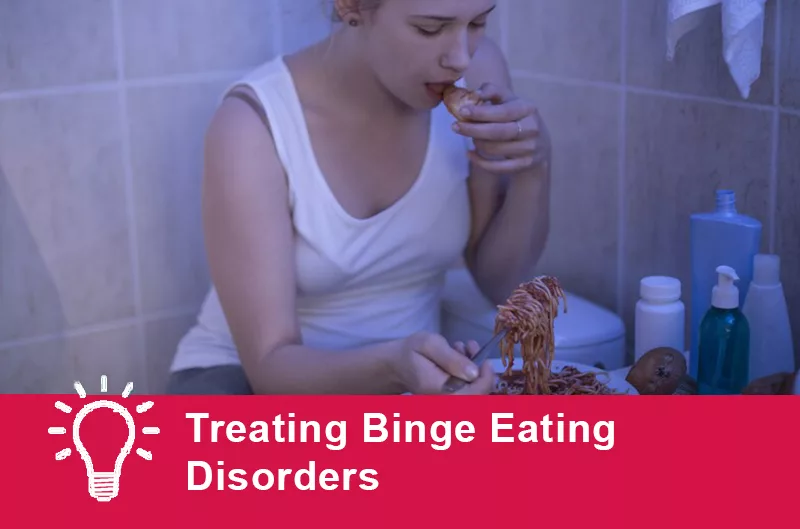In The Carlat Child Psychiatry Report, Sara Weekly, MD, child and adolescent psychiatrist and clinical assistant professor at New York University School of Medicine, gave the following advice on BED treatment strategies:
Consider cognitive behavioral therapy: CBT currently has the strongest evidence base among psychotherapeutic options for treating BED, although Interpersonal therapy (IPT) and dialectical behavioral therapy (DBT) also show promise in studies (Iacovino J, et al, Curr Psychiatry Rep 2012; 14(4): 432-446).
Nutritional strategies can be effective: Nutritionists can help children and their parents learn how to develop balanced meal plans. Avoid punitive or restrictive meal plans. Specifically, behavioral weight loss programs that focus primarily on calorie and exercise goals are generally not recommended for kids and teens with BED.
About complementary health approaches: Mindfulness, yoga, and meditation have been shown to be effective for patients with eating disorders, and there are preliminary studies that show promise in BED (McIver, S et al, Complement Ther Med 2009; 17(4): 196–202). These methods attempt to reconnect patients’ thoughts to their physical bodies, encouraging more attunement to natural sensations and cues and decrease baseline levels of anxiety and distress.
Using psychopharmacology: Although no medication is FDA-approved for use for BED in a pediatric population, several classes of medications have shown promising results (McElroy, S et al, Ther Clin Risk Manag 2012;8:219-241), including the following:
Read the full free article for free in The Carlat Child Psychiatry Report, which includes assessing patients for BED.
Consider cognitive behavioral therapy: CBT currently has the strongest evidence base among psychotherapeutic options for treating BED, although Interpersonal therapy (IPT) and dialectical behavioral therapy (DBT) also show promise in studies (Iacovino J, et al, Curr Psychiatry Rep 2012; 14(4): 432-446).
Nutritional strategies can be effective: Nutritionists can help children and their parents learn how to develop balanced meal plans. Avoid punitive or restrictive meal plans. Specifically, behavioral weight loss programs that focus primarily on calorie and exercise goals are generally not recommended for kids and teens with BED.
About complementary health approaches: Mindfulness, yoga, and meditation have been shown to be effective for patients with eating disorders, and there are preliminary studies that show promise in BED (McIver, S et al, Complement Ther Med 2009; 17(4): 196–202). These methods attempt to reconnect patients’ thoughts to their physical bodies, encouraging more attunement to natural sensations and cues and decrease baseline levels of anxiety and distress.
Using psychopharmacology: Although no medication is FDA-approved for use for BED in a pediatric population, several classes of medications have shown promising results (McElroy, S et al, Ther Clin Risk Manag 2012;8:219-241), including the following:
- Antidepressants: SSRIs in general appear to help with binging, eating related psychopathology, and depressive symptoms. Multiple meta-analyses show a reduction in BED symptoms and less frequent relapse with antidepressants, with the strongest evidence available for SSRIs. However, SNRIs, such as bupropion (Wellbutrin) have also shown promise in reducing these symptoms. Bupropion may have the additional benefit of weight loss/mild appetite suppression (Goracci A et al, J Addict Med 2015;9:1–19). However, bupropion is also contraindicated in patients who are actively purging—you should proceed with caution on any patient you suspect of vomiting or abusing alcohol.
- Anticonvulsants: After observations that binging behavior seemed to stop with phenytoin use, antiepileptic medications became a target of study. Useful in co-morbid mood disorders and known for its promotion of weight loss, topiramate (Topamax) has been tested and is effective for weight loss and decreasing binge frequency in adults, but many people dropped out of treatment in these studies because of side effects such drowsiness, dizziness, and loss of coordination (Berkman ND et al, Management and Outcomes of Binge Eating Disorder, Agency of Healthcare Research and Quality 2015).
- Stimulants: FDA-approved for the treatment of adults with BED, lisdexamfetamine (Vyvanse) has been a hot topic of discussion. There is no question that the medication is effective for BED. But, as with many stimulants, there is a concern about substance abuse and diversion. Atomoxetine (Strattera) also has shown some preliminary evidence for efficacy in symptoms, as have stimulant medications other than lisdexamfetamine.
Read the full free article for free in The Carlat Child Psychiatry Report, which includes assessing patients for BED.


_-The-Breakthrough-Antipsychotic-That-Could-Change-Everything.webp?t=1729528747)



